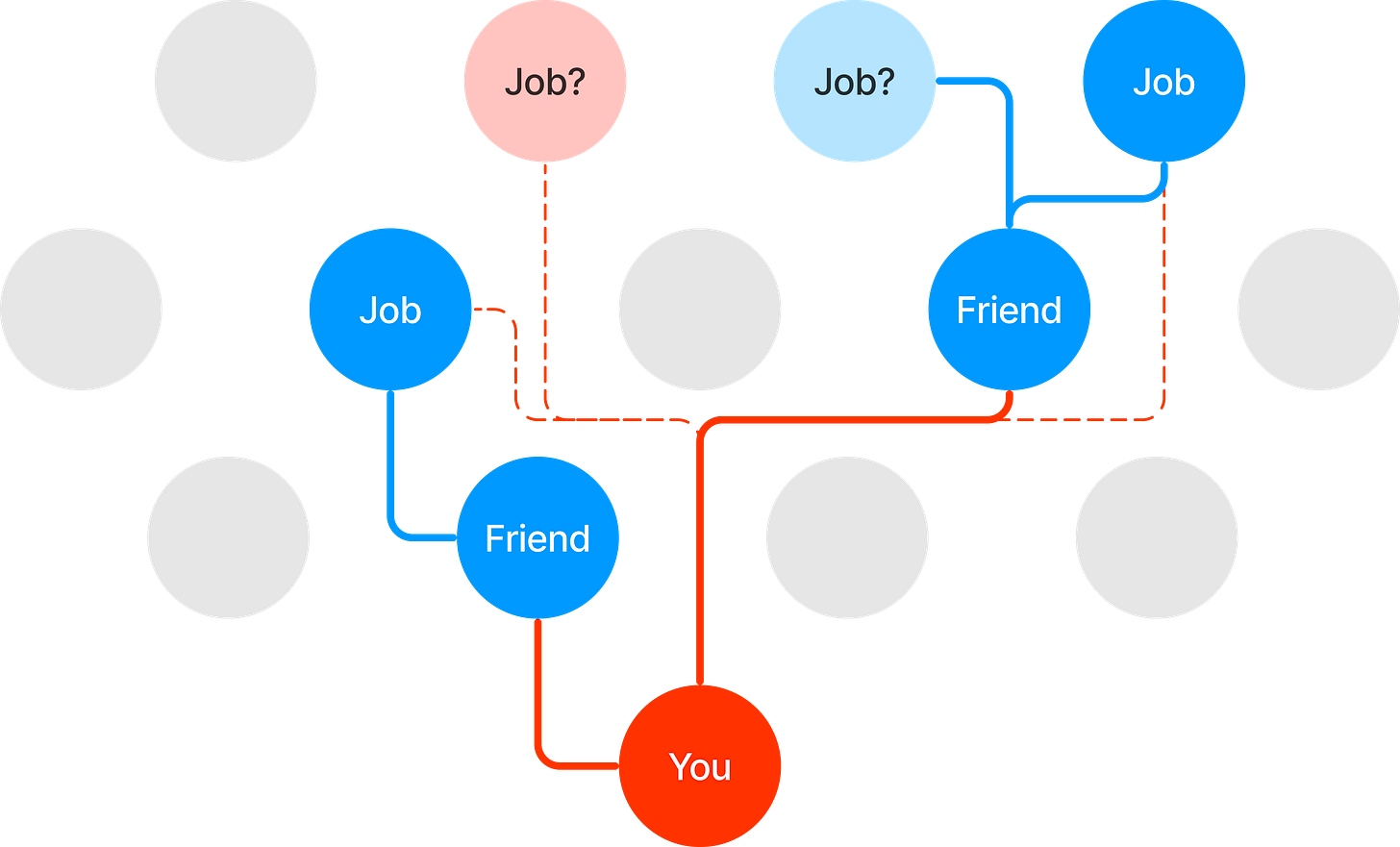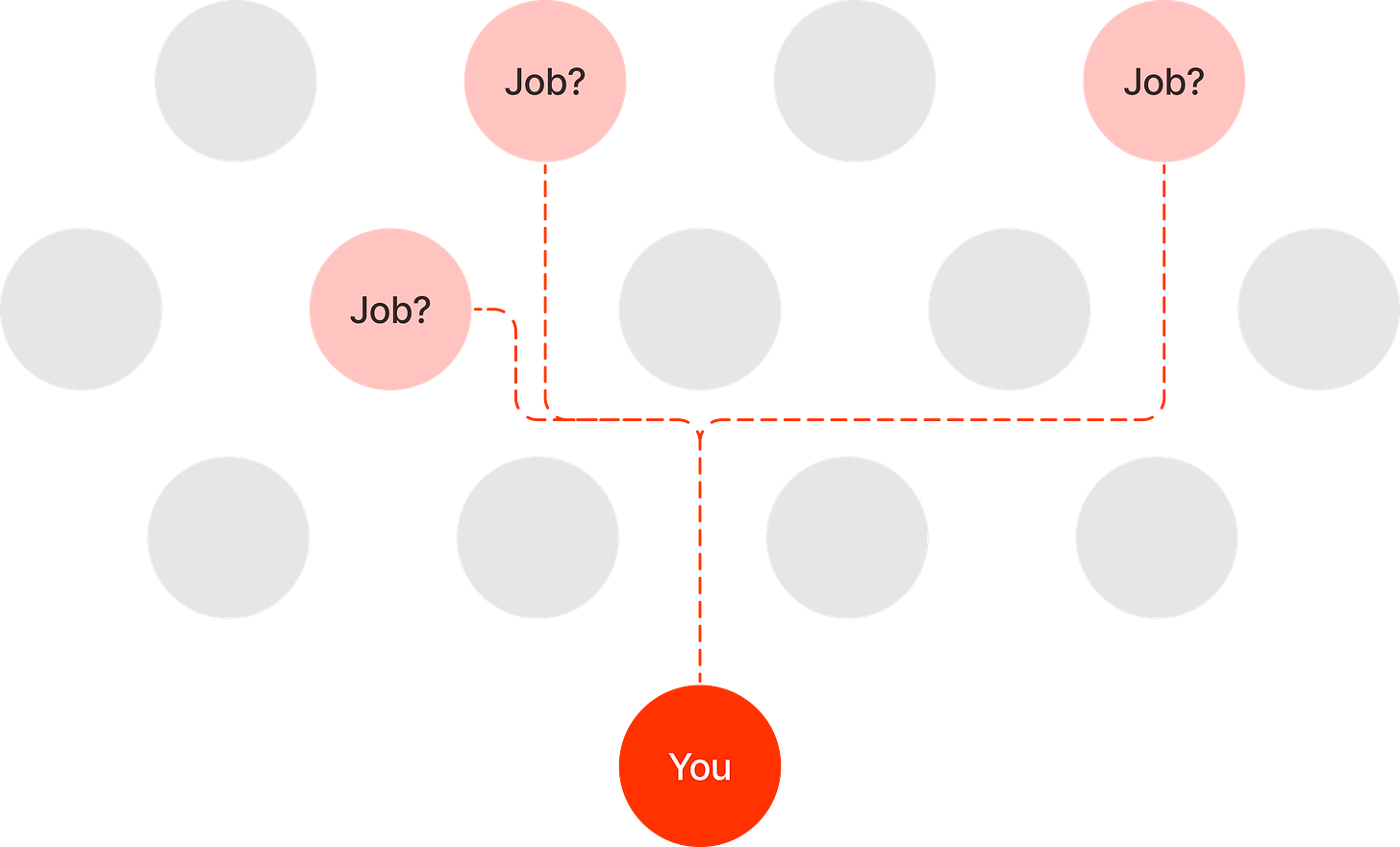Applying to jobs (Learnings from over 50 applications)
Balancing discovery, networking, applying, and optimizing
I’m two months into looking for my next job, and I think it’s time to talk about how it’s going.
At this point I have applied to over 50 different roles. I’ve been rejected from 3 of them, haven’t heard from the others, and am in the process of applying to even more. I know a couple of people subscribed to this newsletter who are also going through the job hunt – either dissatisfied with their current roles or hoping to start something new – so maybe some of the learnings from my experience can help the process for them and you if you’re thinking about making a career change.
The percentage-point-polish
I've been thinking a lot about how I'm optimistically 80% qualified for many of the roles I apply for. That 80% can be raised to a higher score, but it's unclear how much more work I actually need to put in to do so. It feels like I could invest a day of work into my portfolio, or improving my website, or updating my Dribbble account, or making my resume easier to scan, and only earn 0.1% or 0.01% more of a chance to get a job.
Day after day I try to inch that percentage point up more and more, but it still feels like it doesn’t quite matter because the person reviewing my application may be looking for their own green flag right out of the gate. That’s partially what the 0.01% improvement is hoping to achieve – by polishing the slightest of rough edges, I’m hoping I don’t trigger a bias from whomever is looking at my application. But for a lot of roles it feels like the chance of raising an eyebrow of interest is almost a total 50/50, regardless of how much I focus on the details.
It's a never-ending process of iteration and it's an insane amount of work, but it's all in pursuit of that incremental improvement, hoping to increase my chances by just a fraction of a percent. First impressions are everything, especially with such a short timeframe of being assessed by a recruiter when there are so many people applying for roles.
A network as a differentiator
Getting a job today feels very much like a competition, especially when there are so many qualified tech workers floating around from the last year of tech layoffs, and they seem like they’ve all wrapped up their severance package vacation and are starting to look for their next thing.
In light of this, I've pondered whether it would be more advantageous to spend my percentage-point-polish time networking with friends and secondary-connections who already know my skills, rather than solely relying on my own individual outreach.
I try to imagine the job hunt process as a lake of stepping stones. I’m trying to jump to individual stones that only I can reach, but if I lean on my network, it can help me reach stones that are one or two hops away.
The hard realization though is that sometimes I need to learn about stones in the distance to chart my path to them and then ask my network for help. In order for this to work, I need to know what I’m looking for, which means balancing job discovery, networking, applying, and optimizing my profile (percentage-point-polish).

The tough reality is that even if I do get a boost of referral from a friend, more times than not there will be a stranger on the other side of the application. Warm referrals do help – it could be a 2.5% boost or as much as a 25% boost – but if my profile doesn’t make a great impression, it won’t help.
It’s therefore important to use both strategies – leaning on my network for roles it may be connected to while diversifying my choices by looking for roles on my own.
What is even out there?
When I first started my new job hunt about two months ago I mostly was just looking to see what companies were out there. This strategy was very similar to how I got my job at Bird. Even if a company didn’t have a role posted, I could cold email them with an interesting snippet on my background, and then follow up with a case study (like what I wrote about last week) if I was feeling passionate about the job.
It still is hard to know what is out there though. Some of the resources I’ve used:
Angel.co (Now called Wellfound) has some decent startups listed (and some really amateur ones), but their interface is time-consuming to browse through.
Crunchbase only gives you a limited number of searches on their free plan. If you use the filters creatively (like when the startup was founded or last raised money) you can start getting some interesting companies.
Massive has a great list of startups, but a lot of them have reached a level of maturity beyond the early-stage “we just need people to get stuff done.”
Subscribing to a newsletter like StrictlyVC is a good way to get a pulse on who has raised recently, but it really is a firehose of all stages and types of companies.
ApplyAll is a more passive way to auto-apply your resume to jobs out in the world. If you’re still employed but looking to get your resume in front of other companies, this is a great option.
It seems like the best way to get into the early-stage companies is to go to the VC world where they are constantly looking for startups and have a sense before anyone else about what is coming down the pipeline on the hiring side.
I recently was introduced to an amazing VC talent partner who was able to get my profile in front of other talent partners, rapidly multiplying my reach. We’ll see how the VC Talent network pans out, but it feels like the job source with the most momentum at this point.
The mission isn’t the only thing that matters
The first roles I’ve applied to I carefully vetted to feel like I would be an advocate for their missions, but I started to realize that a mission isn’t the only reason anyone would want to work for a company. Mission, mentorship, friendships, learning, exploration, entertainment, freedom, money – there are a lot of other things that come with a job.
With that realization, I started to widen my job requirements. It felt a bit disingenuous at first because I tend to only work on companies I feel like I’d be a massive advocate for, but I am starting to entertain the possibility of some of those other benefits of my next job. Regardless of the mission, there’s a lot to gain with the next role, and sometimes it’s hard to know by judging from a job description or a website.
For the companies I have found with cool missions, I took the initiative to reach out via email, expressing my versatility and asking if they'd be interested in chatting. Admittedly, I suspect some of my emails ended up in spam folders, but I'm exploring new strategies, like leveraging LinkedIn Premium, to see if it gets me in front of the right people.
However, despite these strategies and the countless hours I've poured into the job hunt, I find myself facing a unique challenge: not having a company I'm wholeheartedly passionate about.
In my job at Bird, I had what felt like the perfect blend of my interests and abilities. It's hard to replicate that, and it leaves me feeling somewhat disheartened. But I've come to realize that my values and priorities evolve with time. As I continue on this journey, I'm increasingly open to broader experiences and unexpected opportunities. Who would have thought I'd consider a company in the medical space? Yet, I stumbled upon a startup on Twitter working on early cancer detection, and suddenly, I'm intrigued. Their mission is exciting and impactful. If only my emails would get a response…
Reckoning with the void
The hardest part of applying for a job is the uncertainty of whether what I sent was actually received or considered. It almost feels like there should be some sort of consortium of companies that hire well where they all have a pact that they’ll get back to an applicant with 10 business days of their application. Refreshingly, Adyen has commits to 5 business days on their careers page.
We’ll see if they keep their promise…
This still feels like a very one-sided part of the hiring process, where it takes too much effort for a company to be transparent about where they are at with the hiring process. Curious if there’s any way to solve this besides trying to shift the hiring culture of an entire industry.
Maintaining momentum and persistence
I remember my first job as a dishwasher; I went back week after week, expressing my unwavering interest for four weeks in a row until my boss finally asked if I could come in and work that same night. It's a motivating example of persistence paying off, and it’s an example I use to remind myself that sometimes I just need to keep going.
If I were to give any advice to anyone in a similar situation, it would be this: once you get your foot in the door, follow up incessantly. I often remind my friends that it’s hard to annoy someone who has expressed interest in you as a candidate, and it will often separate you from other candidates. Obviously don’t be insufferable, but once you’ve gotten any sign of a green-light, it’s ok to show your determination.
The process of getting a new job is a long one – my friend recommended starting to look for a role 6 months before I thought I’d want my next role. It makes sense too. You need time to get your profile to that 80%+, time to let your friends and connections know you’re on the hunt, time to discover what’s out there, and time for companies to make roles available.
To be realistic about my cold-applications, I’m aiming to send over 200 in the next week or two, and as for my warm introductions, I’m hoping to keep my conversations with VC talent partners and friends going. 200 seems insane, but it feels like it is what it takes to get those initial conversations started.
Got any tips on the next 200 applications? Or ways you’d go about the job hunt? I’m all ears so let me know in the comments or message me separately.
For everyone in the process of looking for their next role, I hope you’re having success, and if you ever want to game-plan on how to get more interviews, I’m always down to chat.







